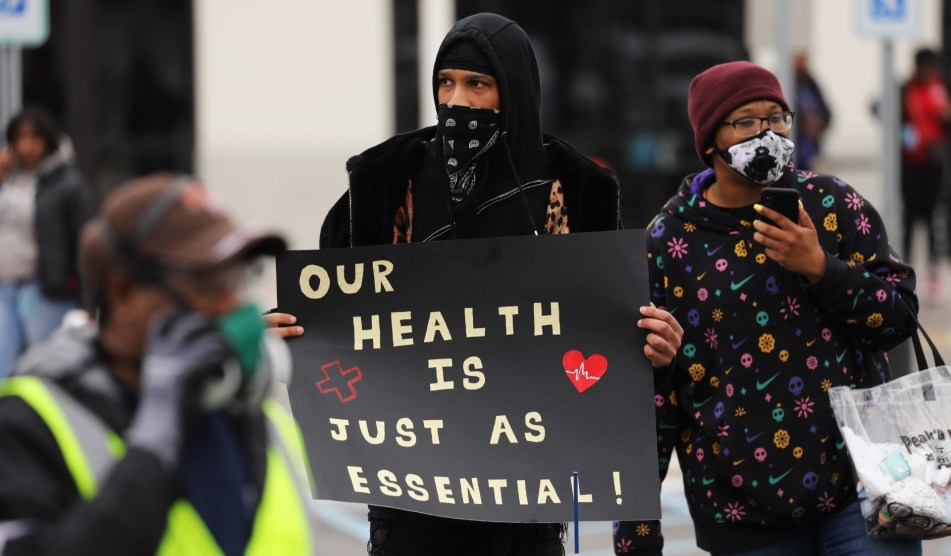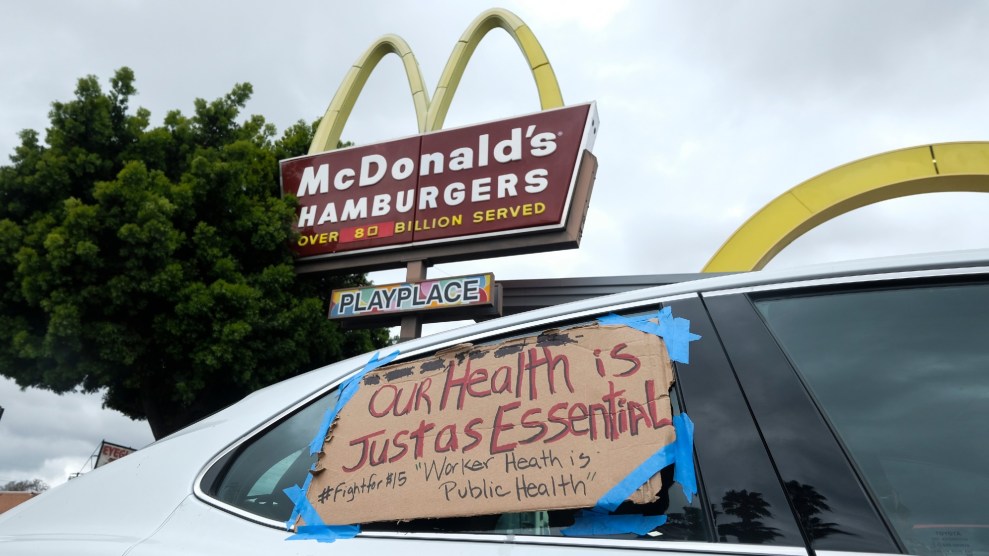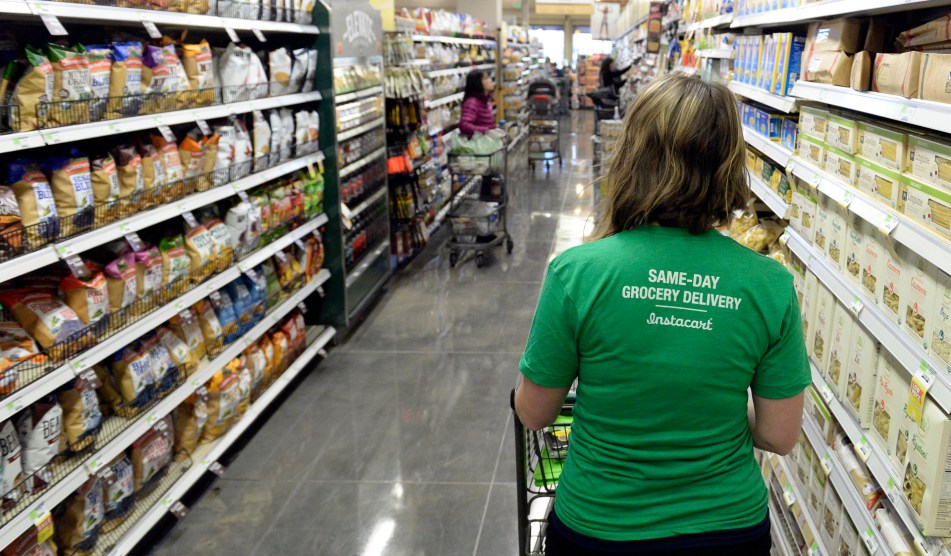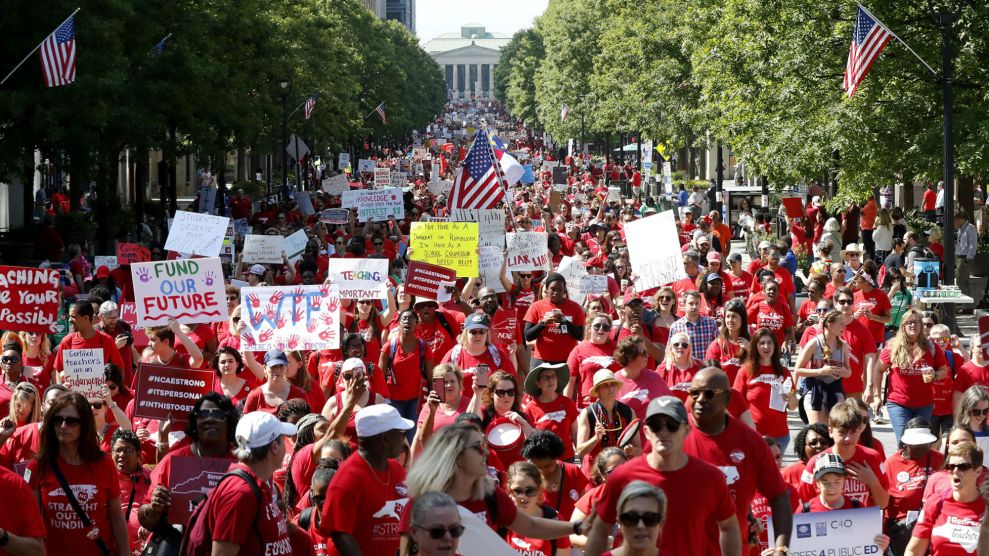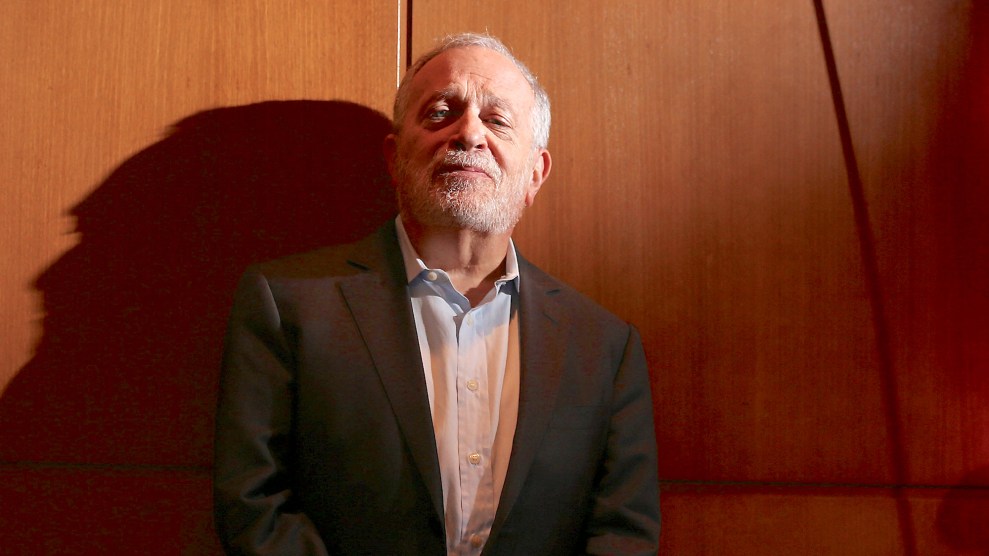
Steve Russell/The Toronto Star/Zuma
Essential workers have been heralded as “heroes” during the pandemic, cheered on by applause and music every night in some cities. While the symbolic appreciation is nice, the realities on the ground have been less so. The people who make our health care and food supply systems run, deliver packages and meals, and sanitize public spaces have been hit especially hard by the virus. And so far, these workers haven’t gotten much by way of increased pay and benefits. Congress expanded paid sick and family leave to workers through the Families First Coronavirus Response Act in March, but loopholes in the law left as many as 75 percent of workers without coverage.
With no national hazard pay, essential workers are left to the mercy of their employers. Some retailers offered temporary $2 pay bumps at the beginning of the pandemic, but many companies are starting to roll these “hero” raises back. At the same time, workplace safety has often fallen by the wayside. This week, the AFL-CIO filed a lawsuit asking a court to order the Occupational Safety and Health Administration to develop temporary emergency standards for workers; the union says OSHA has so far issued zero coronavirus-related citations in the pandemic, despite egregious outbreaks in dozens of meatpacking plants and food packing facilities.
“At a time in our nation’s history when we need a very strong labor department and a very strong OSHA inside the labor department, it’s basically dead,” says Robert Reich. He would know about the capacity of these federal agencies: He served as labor secretary under President Bill Clinton from 1993 to 1997 and helped implement the Family and Medical Leave Act and a minimum wage increase during his tenure.
Things look a little different these days. Labor Secretary Eugene Scalia has been making Fox News appearances urging corporate tax cuts and liability shields for employers who bring employees back to work. Trump’s Labor Department “wants to be as friendly as possible to business and not impose any burdens on business whatsoever,” says Reich.
Reich now writes books and is a professor of public policy at the University of California, Berkeley. I asked him what the labor department should be doing to help workers in a pandemic.
First, in what ways is the Trump administration failing workers the most, in your view?
The Trump administration is failing workers in almost every respect. Trump’s labor department is almost nonexistent. I mean, you would expect that the department at a time like this would be helping Trump formulate policies to get people back to work safely, to make sure that anybody who was sheltering in place have income and income support and unemployment insurance, and that the unemployment insurance system is working. And that the Occupational Safety and Health Administration, which is part of the labor department, would be setting standards across the country for a kind of minimum safety standards, for occupational safety in factories and warehouses and in meat packing, in delivery, and in hospitals and wherever essential workers are putting their lives on the line. But OSHA is not establishing those standards.
I know you’ve said that OSHA has the legal authority to require private employers to provide essential workers with protective gear. Can you say more about what OSHA should be doing right now? Why are they issuing recommendations rather than directives?
Well, OSHA is issuing recommendations instead of directives because OSHA doesn’t want to be directive. OSHA, under Trump, wants to be as friendly as possible to business and not impose any burdens on business whatsoever, even though we are in a pandemic. So at a time in our nation’s history when we need a very strong labor department and a very strong Occupational Safety and Health Administration inside the labor department, it’s basically dead.
The impact is very clear. I mean, we are in a pandemic. And people are getting sick and dying. We’ve got ninety thousand or more Americans who already have died because of this pandemic. Many of them have been workers. They’ve been nurses. They’ve been hospital orderlies. They have been warehouse workers. They’ve been workers who are in various plants. Meatpacking seems to be particularly hazardous for a variety of reasons. Workers who are in nursing homes. I mean, all of these workers need to have uniform and strict national protection and those protections have got to be enforced.
Employers who do not fulfill their obligations with regard to workplace safety need to be penalized and face such high penalties that they are forced to do it. The chaos we now have is just a mirror of the chaos we have with regard to the Trump administration’s pandemic response overall. It’s not just decentralized. It is chaotic. Nobody knows who is in charge of what. And nobody is doing anything.
After two months of lockdown, many companies are starting to roll back the temporary pay raises they’ve given some essential workers. There have been more than 40 grocery chains that gave their employees a temporary $2 pay raise and now have decided that it’s time to roll that back. Do you think that some of those changes could be made permanent for essential workers? How could they be enshrined in federal law?
I think many of the changes should be permanent, certainly with regard to hazard pay. I mean, federal law should and could easily say employers who are employing workers in hazardous occupations such as X, Y and Z, or dubbed by OSHA to be hazardous, those employers have got to pay X in terms of hazard pay, or X over the minimum wage.
When you consider that a company like Amazon has revoked its $2/hour hazard pay for its warehouse workers and that Whole Foods is no longer providing hazard pay for its workers—Amazon owns Whole Foods. Amazon is one of the most profitable companies in America right now. Its stock price has soared in this pandemic. Amazon is rolling in money. There’s no question that Amazon can afford to protect its workers and to provide hazard pay and paid sick leave. But Amazon has chosen not to be a leader, even though it is making huge amounts of money off the backs of a lot of very, very hard working people who are risking their lives in warehouses and in Whole Foods stores.
As you know, meatpacking was already a dangerous industry before the coronavirus. Human Rights Watch has put out two reports in 15 years condemning the working conditions in meatpacking plants as unsafe. It’s been playing out for decades under Democratic and Republican administrations alike. What are your thoughts on how that happened and how the labor department should fix it?
It’s got to be unremitting in its focus on the most vulnerable workers in America and those employers in those industries that have taken most advantage of those vulnerable workers. Now, it’s no coincidence that a lot of those vulnerable workers are Latinos or African-Americans. Many states that are dominated by Republican legislatures and governors, who couldn’t care less about people of color, just turn their backs on many of these issues. Again, these problems predated the pandemic. The pandemic has made them all the worse.
If Biden wins and Democrats take the Senate, what do you think the biggest labor priority should be in Congress?
The most important thing would be to make it easier to form unions. In the 1950s and early 1960s, over a third of all private sector workers in the United States were unionized, which gave them enormous power and voice and clout. But now 6.4 percent of private sector workers are unionized. Only 6.4 percent. They have very little voice, very little power, very little clout, not only in terms of decisions that companies make, but also in Congress, in the corridors of power in Washington.
And the decline of labor is directly related to the decline of wages and working conditions and safety and benefits and all the other things that American workers have experienced over the last 40 years.
What do you think the coronavirus will mean for unions?
Surveys show that most American workers want to join a union if they’re not in a union already. They need a union and they know they need a union if they are going to get wage increases and benefit improvements and if they are going to see the conditions under which they work be safer and healthier. So workers want unions. I think that when we come out of this pandemic, there may be a renewed attention to worker voice and worker action.
What are the signs of that you’re seeing?
We saw some hints of this last year and the year before, some of the wildcat strikes of teachers in states that are very unfriendly to unions. The governors caved in. Those strikes were very popular. Teachers were very popular. We’ve seen the same thing with nurses. Nurses are now national heroes. If they weren’t before, they now certainly are. And nurses are paid very little. Hospitals are cutting nursing salaries even as we speak. I think nurses really are going to be better organized and more vocal, just like teachers.
A lot of the workers who have not had adequate representation, after risking their lives in the way they have been risking their lives and after putting up with the lack of paid sick leave, a lack of paid family leave, lack of hazard pay, I think workers have had enough. Frankly, I think that we’re going to see a wave of labor activism such as we haven’t seen in this country in decades.
What’s your message for people who are working essential jobs right now?
My message for them is: number one, thank you. Thank you for risking your lives for the rest of us. My second message is once this is over, threaten to go on strike. Go on wildcat strike. Do whatever you need to do to improve your wages and working conditions. You deserve it. You have the public support. The big corporations—many of them for profit and are doing very, very well; they really need to respond better to your needs and they can afford to do so. The stock market is trending upward. Some of these big corporations like Amazon and Walmart have never done as well.
Nobody should have to choose between their health and safety on the one hand and a livelihood, making enough money to live on and for their family to live on, on the other. That is an inhumane choice to impose on anybody, but in the wealthiest nation in the world, which is what we still are, even in the midst of another Great Depression and a pandemic, that should not be a choice that anybody has to face. Shame on any employer that puts workers in that position.
The Trump administration and some Republican governors and even Elon Musk says that this is all about freedom. Freedom? If you are putting your life on the line and you are risking your health, that’s not about freedom. That’s about greedy people talking about making money off of the backs of workers that have no choice.

